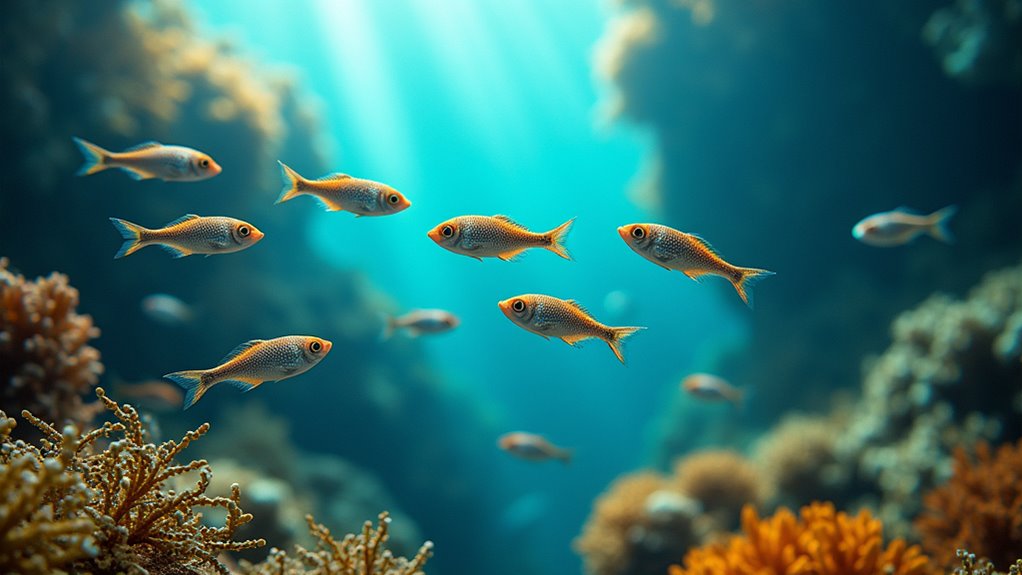Yes, fish do sleep, but their rest looks different from ours. Instead of deep sleep, they have periods of reduced activity and metabolic slowdown, staying alert enough to respond quickly if danger appears. Some float stationary, others hover or hide in structures. Their sleep varies by species, allowing them to conserve energy while remaining vigilant. Curious about how fish manage their sleep and stay safe? Keep exploring to discover more fascinating behaviors!
Key Takeaways
- Fish do rest and enter sleep-like states, but they do not experience deep, prolonged sleep like humans.
- Rest involves periods of reduced activity and metabolic slowdown, helping fish conserve energy.
- Fish remain alert during rest, maintaining the ability to respond quickly to threats.
- Different species have unique sleep behaviors, such as floating stationary or hiding in structures.
- Sleep and rest are essential for fish survival, aiding in energy conservation and predator vigilance.

Have you ever wondered what makes fish so fascinating? One of the most intriguing aspects is how they communicate with each other. Unlike humans, fish rely on a variety of signals to share information, navigate their environment, and stay safe from danger. Fish communication isn’t just about simple gestures; it includes visual cues, sounds, and even chemical signals. For example, some fish produce sounds by rubbing their bones or swim bladders together, creating clicks and grunts that other fish can hear. Bright colors and patterns also serve as signals, warning predators to stay away or attracting mates. These visual cues are especially effective in the clear waters where many fish live, allowing them to send messages over short or long distances. When you observe a school of fish darting and flashing their colors, you’re witnessing a complex form of communication that helps them survive in their aquatic world.
Now, consider the constant threat posed by aquatic predators. Fish have evolved remarkable behaviors to avoid becoming prey. Many fish are active during the day, using their keen eyesight to spot predators early. Others have developed quick reflexes, darting away at the slightest sign of danger. Some fish rely on their environment, hiding in coral reefs, rocks, or sandy bottoms when predators are nearby. Certain species also employ deception, like mimicking the appearance of inedible objects or using disruptive coloration to blend into their surroundings. You might notice that some fish form tight schools, moving in unison to confuse predators—this collective behavior makes it harder for an attacker to single out an individual. These tactics are essential for their survival, especially since many fish must constantly remain alert to the presence of predators lurking around them. Additionally, a high level of Cultural Intelligence can help fish adapt their behaviors to changing environments and threats, much like humans learn to navigate diverse social settings.
As for sleep, fish do rest, but not in the same way humans do. Instead of deep, prolonged sleep, many fish enter periods of reduced activity and metabolic slowdown, often during the night. Some float in one spot, others hover near the bottom or hide in crevices. Interestingly, their sleep patterns are influenced by their environment and the presence of predators. For example, some fish remain alert even during rest, ready to respond quickly if danger approaches. This ability to rest without fully losing awareness helps them conserve energy while staying safe. So, when you see a fish resting quietly, remember that it’s not unconscious; it’s engaged in a unique form of sleep tailored to its aquatic lifestyle. Fish sleep varies widely among species, but one thing’s clear: their behaviors are finely tuned to survive and thrive in their underwater world.
Frequently Asked Questions
Do Different Species of Fish Have Different Sleep Patterns?
Different fish species have varying sleep patterns, influenced by their unique fish circadian rhythms. Some fish rest during the night, while others remain active or take short naps throughout the day. If your fish doesn’t get enough rest, it can experience sleep deprivation effects, weakening its immune system and affecting behavior. You should observe your fish’s habits carefully to guarantee they’re getting proper rest tailored to their specific needs.
Can Fish Sleep While Swimming?
Imagine a ballet where the dancers glide seamlessly—that’s how some fish sleep while swimming. Yes, certain fish, like sharks, can sleep while swimming, thanks to their unique breathing and swimming patterns. Their bodies rest, but they keep moving to guarantee water flows over their gills. This incredible adaptation allows them to sleep without stopping, blending rest with continuous swimming—a mesmerizing dance of nature’s ingenuity.
How Do Fish Know When It’s Nighttime?
You might wonder how fish recognize nighttime. Many rely on their sense of light, detecting changes in natural light levels. Nocturnal fish and bioluminescent species often adapt to low-light conditions, with some sensing the Earth’s magnetic field or using specialized eyes. These adaptations help them stay alert during the night, ensuring they find food and avoid predators even when it’s dark.
Do Fish Dream Like Humans?
Imagine you’re a fish drifting through a world of shimmering shadows, wondering if dreams dance behind your eyes like humans. While dreaming behavior in fish remains a mystery, some studies suggest they might experience simple dreams during rest. Sleep deprivation can affect their health, much like humans. Although we can’t say for sure if fish dream, their quiet moments hint at a fascinating, hidden domain of underwater imagination.
Are There Any Fish That Don’t Sleep at All?
You might wonder if any fish don’t sleep at all, and the answer is yes. Some fish, like certain species of sharks, keep swimming continuously and don’t have traditional sleep patterns. Instead, they rest in a way that allows them to stay alert to predators while conserving energy. These fish have unique sleep behaviors, showing that fish sleep patterns vary widely, and not all fish follow the same sleep cycle as humans do.
Conclusion
Now you know that fish do sleep, just in a way unique to their species. For example, some fish rest by floating passively, while others hide in caves. Did you know that over 95% of fish species have special sleep behaviors? This shows how diverse and fascinating fish are. So next time you see a fish darting around, remember they also need rest to stay healthy. Fish truly have some incredible and surprising behaviors!








